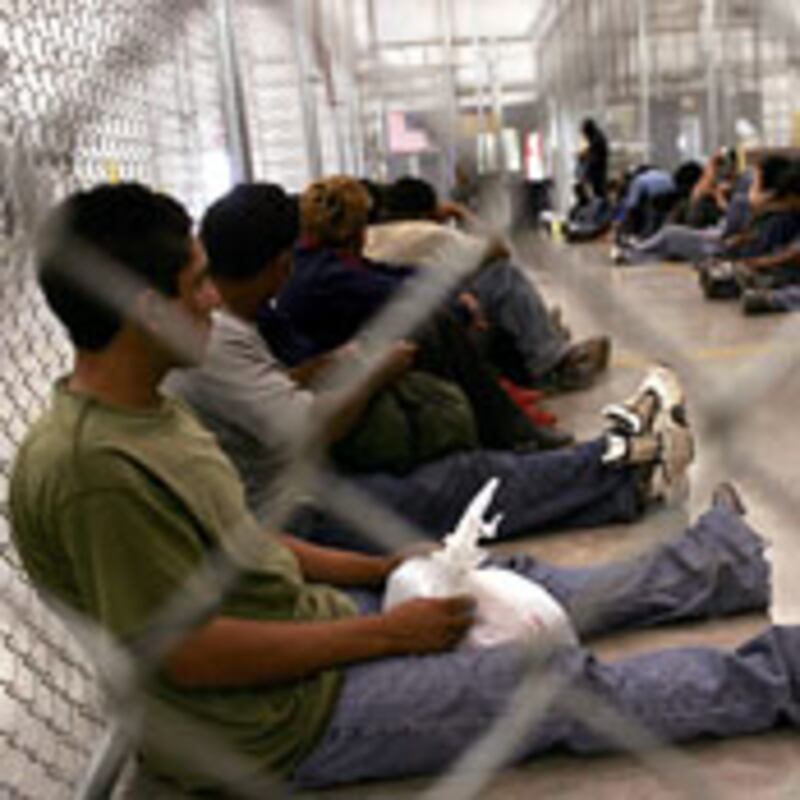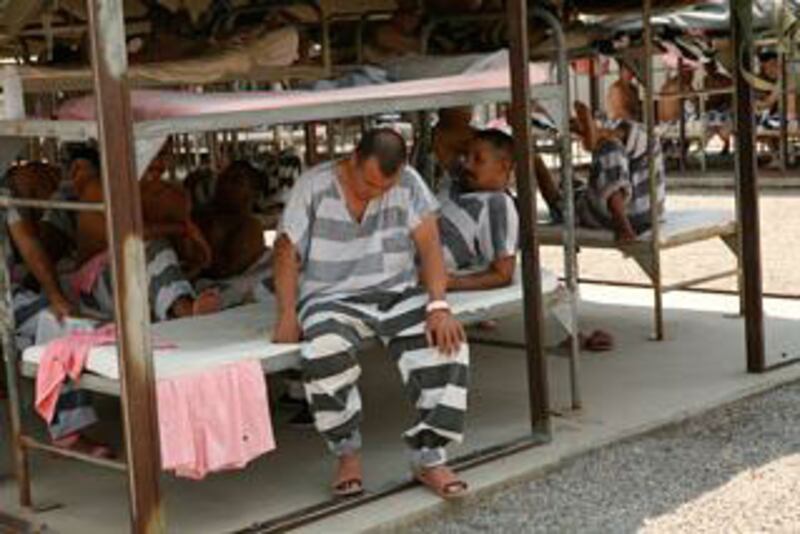
It’s been less than two weeks since Arizona’s governor signed the harshest immigration law in the nation, but Maricopa County Sheriff Joe Arpaio says he’s ready to jail as many “illegals” as his deputies round up. And if he doesn’t have the bed space, he’ll just pitch more Korean War surplus tents in his famed Tent City jail.
He invites other police agencies in Arizona’s most populous county to deposit arrested immigrants at his jail, too, instead of delivering them directly to the Department of Homeland Security for removal from the United States. He’s not worried about costs. He will just bill the cities and towns whose police agencies do the arresting, he says.
State Senator Russell Pearce, the law’s sponsor, isn’t worried about clogged courts and jails. He says the law will cause many to “self-deport.”
If Arpaio has his way, Maricopa County’s correctional facilities and courts will be packed with unauthorized immigrants, further straining the resources of a system already stretched to the breaking point. Even as proponents of the law vow it will save money, the prospect of arresting, convicting and jailing even a fraction of the state’s 460,000 undocumented immigrants has many budget-strapped federal and state officials worried, and some hint they’re quietly rooting for the legal challenges now under way to prevent the law from ever being implemented.
Janet Napolitano, the secretary of Homeland Security who had vetoed similar laws when she was governor of Arizona, told a Senate committee on April 27 that she has “deep concerns” the law will “siphon resources” her department needs to go after “those who have committed the most serious crimes.” If the law is implemented, Homeland Security will be working overtime processing, housing, and transporting Mexican nationals back to the border. The department has four detention facilities with a total of only 2,900 beds.
What’s more, savvy arrested immigrants who’ve been in Arizona over 10 years and have American relatives know they can contest deportation in federal immigration court. That could take years, given the backlogs and understaffing in Arizona immigration courts. “I already have cases that will be heard in 2014,” says Phoenix immigration lawyer Jillian Kong-Sivert, who adds that many lawyers will require arresting officers, like Arpaio’s deputies, to appear in immigration court.
That’s another unexpected law-enforcement cost that will be passed along to the taxpayer.

Arpaio enthusiastically supports the new law, slated to take effect this summer—barring any delays prompted by voter referendums or legal challenges. The measure makes it a crime for unauthorized immigrants to set foot on Arizona soil, and could criminalize citizens who transport, live with, or otherwise “harbor” immigrants they know are in the country illegally. It requires all police agencies to enforce immigration laws, and if authorities don’t stop people they reasonably suspect to be undocumented immigrants, the cities and counties that employ them face lawsuits by Arizona residents, at taxpayer expense.
State Senator Russell Pearce, the law’s sponsor and Arpaio’s former chief deputy, isn’t worried about clogged courts and jails. He says the law will cause many to “self-deport.”
Those who are arrested will likely stay in jail holding cells until Immigration and Customs Enforcement picks them up for processing, he says, so there wouldn’t be court or jail costs. Pearce claims that in the long run the law will save the state $3 billion in emergency-room, education, and incarceration costs, but he allows that figure would hold true only if all 460,000 undocumented immigrants leave Arizona.
(His numbers are at odds with a 2007 University of Arizona study, which found that immigrants bring in $3 for every $2 the state spends on services for them.)

Pearce credits himself for conceiving of Tent City, an alfresco jail complex that is one of several Maricopa County jails. Tent City is encircled by razor wire and consists of dozens of open-air tents crammed with double bunks. Arpaio loves to brag about the low-cost tents; they are part of his highly sophisticated publicity machine. In the summer the tents are hot, in the winter they’re cold. Inmates eat their two daily meals and shower in bare bones, but air-cooled, indoor facilities.
Arpaio’s Tent City already houses several hundred undocumented immigrants serving time for violating two notorious Arizona immigration laws. One 2006 measure makes felons out of immigrants who hire coyotes. The immigrants are charged with conspiring with the coyote to smuggle themselves through Arizona. A 2007 law intended to penalize employers for hiring unauthorized workers has slapped the wrists of only two employers, but has given Arpaio cause to raid workplaces and round up dishwashers and landscapers, who serve jail time for working with false papers.
The 77-year-old self-proclaimed Toughest Sheriff in America, who first gained international fame for forcing sentenced and unsentenced jail inmates to wear pink skivvies, is being investigated by the U.S. Department of Justice in Washington for alleged racial profiling in connection with his sweeps of Latino neighborhoods and workplaces, which he calls “crime suppression operations.” He’s being investigated separately by a grand jury in Phoenix for alleged abuse of power, and he’s also being sued by citizens who claim they were racially profiled by Arpaio’s deputies.
“They sue you for everything around here so what’s the big deal if they sue you for illegal immigration,” Arpaio, who maintains his innocence on all fronts, tells The Daily Beast.
Critics of the law say there will be more racial profiling suits, which are defended at taxpayer expense, once the law takes effect. State Representative Bill Koponicki, who voted for the law as a loyal Republican but has serious misgivings about it, figures if only 10 percent of undocumented immigrants are arrested, jails and courts will be overstrained, which will “be expensive for Arizona” at a time when “no one has any money.”
“I don’t have any clue how I’m going to handle this yet,” says Interim Maricopa County Attorney Richard Romley, who has “constitutional concerns” about the law. “It’s clearly an unfunded mandate and during these economic times law enforcement has only so many resources.”
Arpaio, who may challenge Governor Jan Brewer for the GOP nomination for the statehouse this August, announced he is launching his 15th “crime suppression operation,” on the streets of Phoenix this weekend. Since his first such raid in 2007, Arpaio’s deputies have arrested 3,423 unauthorized immigrants under state laws. Another 33,437 immigrants have been turned over to ICE after routine immigration checks in the sheriff’s jails.
His jails have beds for about 10,000 inmates, he says, and currently about 8,500 beds are occupied.
“I’ll make room for 5,000 if I have to,” says the Toughest Sheriff in America.
Terry Greene Sterling is an Arizona journalist who blogs about immigration in Phoenix at terrygreenesterling.com. Her book, ILLEGAL, Life and Death in the Undocumented Underground, will be published in August by the Globe Pequot Press.






